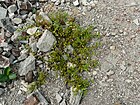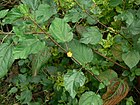Note: This is a project under development. The articles on this wiki are just being initiated and broadly incomplete. You can Help creating new pages.
Difference between revisions of "Corchorus aestuans"
| Line 1: | Line 1: | ||
[[File:Corchorus aestuans (1251101178).jpg|thumb|right]] | [[File:Corchorus aestuans (1251101178).jpg|thumb|right]] | ||
| + | '''Corchorus aestuans''' is an annual plant with erect, sparingly branched stems, growing about 40cm tall. The plant yields a fibre and edible leaves. It is harvested from the wild for local use and is sometimes also cultivated as a fibre plant in tropical W Africa, sometimes also in SE Asia. | ||
==Uses== | ==Uses== | ||
{{Uses|}}, {{Uses|}}, {{Uses|}}, {{Uses|}}, {{Uses|}}, {{Uses|}}, {{Uses|}}, {{Uses|}}, {{Uses|}}, {{Uses|}}, {{Uses|}}.<ref name="Uses"/> | {{Uses|}}, {{Uses|}}, {{Uses|}}, {{Uses|}}, {{Uses|}}, {{Uses|}}, {{Uses|}}, {{Uses|}}, {{Uses|}}, {{Uses|}}, {{Uses|}}.<ref name="Uses"/> | ||
==Parts Used== | ==Parts Used== | ||
| − | {{Parts Used| | + | {{Parts Used|Leaves}}. |
==Chemical Composition== | ==Chemical Composition== | ||
| Line 16: | Line 17: | ||
===Dravya=== | ===Dravya=== | ||
===Rasa=== | ===Rasa=== | ||
| − | |||
===Guna=== | ===Guna=== | ||
| Line 48: | Line 48: | ||
==Mode of Propagation== | ==Mode of Propagation== | ||
| − | {{Propagation|}} | + | {{Propagation|Seeds}} |
==How to plant/cultivate== | ==How to plant/cultivate== | ||
| − | <ref name="How to plant/cultivate"/> | + | Originally native to the Americas, the plant has spread throughout the tropics and has become an invasive weed in some areas.<ref name="How to plant/cultivate"/> |
==Commonly seen growing in areas== | ==Commonly seen growing in areas== | ||
| − | {{Commonly seen|}}, {{Commonly seen|}}, {{Commonly seen|}}, {{Commonly seen|}}, {{Commonly seen|}}. | + | {{Commonly seen|Grassy savannah}}, {{Commonly seen|Fallow land}}, {{Commonly seen|Sandy riverbeds}}, {{Commonly seen|Small alluvial depressions}}, {{Commonly seen|On heavy alluvial soils}}. |
==Photo Gallery== | ==Photo Gallery== | ||
Revision as of 11:29, 18 April 2020
Corchorus aestuans is an annual plant with erect, sparingly branched stems, growing about 40cm tall. The plant yields a fibre and edible leaves. It is harvested from the wild for local use and is sometimes also cultivated as a fibre plant in tropical W Africa, sometimes also in SE Asia.
Contents
- 1 Uses
- 2 Parts Used
- 3 Chemical Composition
- 4 Common names
- 5 Properties
- 6 Habit
- 7 Identification
- 8 List of Ayurvedic medicine in which the herb is used
- 9 Where to get the saplings
- 10 Mode of Propagation
- 11 How to plant/cultivate
- 12 Commonly seen growing in areas
- 13 Photo Gallery
- 14 References
- 15 External Links
Uses
[[:Category:Ayurvedic Herbs known to be helpful to treat |]], [[:Category:Ayurvedic Herbs known to be helpful to treat |]], [[:Category:Ayurvedic Herbs known to be helpful to treat |]], [[:Category:Ayurvedic Herbs known to be helpful to treat |]], [[:Category:Ayurvedic Herbs known to be helpful to treat |]], [[:Category:Ayurvedic Herbs known to be helpful to treat |]], [[:Category:Ayurvedic Herbs known to be helpful to treat |]], [[:Category:Ayurvedic Herbs known to be helpful to treat |]], [[:Category:Ayurvedic Herbs known to be helpful to treat |]], [[:Category:Ayurvedic Herbs known to be helpful to treat |]], [[:Category:Ayurvedic Herbs known to be helpful to treat |]].[1]
Parts Used
Chemical Composition
Common names
| Language | Common name |
|---|---|
| Kannada | |
| Hindi | |
| Malayalam | |
| Tamil | |
| Telugu | |
| Marathi | |
| Gujarathi | |
| Punjabi | |
| Kashmiri | |
| Sanskrit | |
| English |
Properties
Reference: Dravya - Substance, Rasa - Taste, Guna - Qualities, Veerya - Potency, Vipaka - Post-digesion effect, Karma - Pharmacological activity, Prabhava - Therepeutics.
Dravya
Rasa
Guna
Veerya
Vipaka
Karma
Prabhava
Habit
[[:Category:Habit - |]]
Identification
Leaf
| Kind | Shape | Feature |
|---|---|---|
Flower
| Type | Size | Color and composition | Stamen | More information |
|---|---|---|---|---|
| {{{5}}} |
Fruit
| Type | Size | Mass | Appearance | Seeds | More information |
|---|---|---|---|---|---|
Other features
List of Ayurvedic medicine in which the herb is used
Where to get the saplings
Mode of Propagation
How to plant/cultivate
Originally native to the Americas, the plant has spread throughout the tropics and has become an invasive weed in some areas.[4]
Commonly seen growing in areas
Grassy savannah, Fallow land, Sandy riverbeds, Small alluvial depressions, On heavy alluvial soils.
Photo Gallery
- Chaadhari Chunch (Gujarati- ચાદરી ચુઙ્ચ) (2896240720).jpg2
References
External Links
- [ ]
- [ ]
- [ ]
- Pages with broken file links
- Ayurvedic Herbs known to be helpful to treat
- Herbs with Leaves used in medicine
- Habit -
- Index of Plants which can be propagated by Seeds
- Herbs that are commonly seen in the region of Grassy savannah
- Herbs that are commonly seen in the region of Fallow land
- Herbs that are commonly seen in the region of Sandy riverbeds
- Herbs that are commonly seen in the region of Small alluvial depressions
- Herbs that are commonly seen in the region of On heavy alluvial soils
- Herbs
- Pages without herbs images




